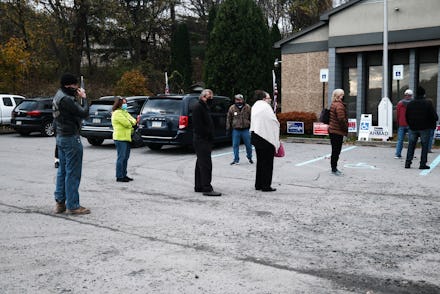Reports of voter suppression are already cropping up in battleground states

Over 100 million — and counting. That's how many ballots have been cast by early voters alone in this year's general election, while scores more voters flock to the polls on Election Day. Despite months of uncertainty about the ability of the Postal Service to deliver absentee ballots, and efforts by Republicans to muddy the mail-in voting waters, early voting has sent the expected turnout for the 2020 election sky-high. Instead, it seems that Americans heading to the polls on Tuesday might be more subject to issue, given reports of voter intimidation or attempted suppression have cropped up in key states.
Early Tuesday, Michigan's election officials tweeted that Flint-area voters had received robocalls erroneously telling voters that they could cast ballots on Wednesday, and that they should wait a day to vote because lines are too long. Tuesday is the last day to vote, so telling people that they can vote Wednesday is a way of suppressing their vote. "We received reports that an unknown party is purposefully spreading misinformation via robocalls in Flint in an attempt to confuse voters there," Michigan Secretary of State Jocelyn Benson said on Twitter. Michigan Attorney General Dana Nessel echoed Benson's calls, urging voters, "Don’t believe the lies! Have your voice heard!"
Michigan is one of the so-called "firewall" states that Hillary Clinton lost in 2016. Joe Biden is leading President Trump in polls there, but it's still a battleground state that is key for the Democrat if he hopes to oust Trump. In another essential state, Pennsylvania, voters reported seeing a man attempting to enter a polling location to "watch" or monitor the polls, as Trump encouraged during the first presidential debate.
While poll watching is technically allowed in most states, there's a fine line between poll watching and voter intimidation. In the video posted to Twitter, two poll workers are seen telling the individual that he's not permitted to enter the polling location, and a tense argument ensues. The Trump campaign's Election Day operations director, Mike Roman, used the clip as evidence that Democrats are trying to "steal" the election, which is untrue. While poll workers are non-partisan officials, the encounter offered an opportunity for the Trump campaign to pivot to their main talking point — that the election is rigged in favor of Democrats — which is, again, untrue.
Meanwhile, The Washington Post reported Tuesday that voters all across the country have "received an estimated 10 million automated, spam calls in recent days telling them to 'stay safe and stay home,'" using vague fearmongering to discourage people from hitting the polls. The Post said these calls are separate from the ones Michigan officials have identified, describing a monotone message that doesn't say anything specific about the 2020 election or the coronavirus pandemic but tells recipients that it's "time to stay home."
But while creepy robocalls have the potential to disrupt voting and angry poll watchers may momentarily disrupt Election Day proceedings, lawyers say that there are protections built into election law in every state to support voters. "There are several federal statutes that prohibit voter intimidation. Every state has their own set of laws as well," Molly McGrath, a voting-rights strategist with the ACLU said to the Public News Service. "So, if anybody does feel intimidated, feel deterred from voting, know that there is help available."